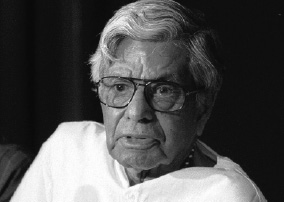Chidambaram Subramaniam
Chidambaram Subramaniam, a “green” leader, died on November 7th 2000, aged 90

Most of the garden around Chidambaram Subramaniam’s house in Delhi was taken up by a cricket pitch, where he entertained friends to a game at weekends. One day in 1966 he gave orders for the garden to be dug up, cricket pitch and all, and planted with wheat seed.
Mr Subramaniam, India’s agriculture minister, believed that the seed, a new variety, would transform Indian farming. Not everyone was convinced. This imported seed, critics said, could introduce foreign pests and diseases, ruining the already impoverished Indian farmer. Nationalists noted that the seed had been developed by an American scientist, Norman Borlaug, and everyone knew that Americans were no friends of India.
Opposition politicians saw the issue as a way of getting at the Congress government. Bureaucrats gave them their tacit support, fearing that the dangerous Mr Subramaniam was pushing ahead too fast, undermining their authority.
The real fear for India, Mr Subramaniam said, was that it faced severe famine unless more grain was produced. Look, he would plant the seed in his own garden, on his cricket pitch. The dramatic gesture in cricket-mad India did not wholly end the opposition to the seed but it was dented. The seed was sown throughout India, in around 1,000 “demonstration” sites, as well as in the Delhi garden. The resulting wheat yield, double that of previous sowings, astonished even Mr Subramaniam.
The pariah seed was suddenly in demand. Some farmers who could not buy the seed stole it. The next year, 1967, India harvested 17m tons of wheat grain. Never before had the harvest been greater than 12m tons. Schools were closed and their classrooms were used to store the extra bounty. Its immediate effect was to have saved many thousands of Indians from starvation. Today India harvests about 70m tons of wheat grain a year, more than enough for self-sufficiency in an ever-expanding population, with some left over for export. This was what came to be called India’s green revolution, a rare example of a discovery delivering even more than it had promised.
Last year there was a lot of support for naming Mr Subramaniam India’s man of the century, even of the millennium. He was too modest, and too wise, to allow himself to be given the laurel for a discovery for which many claimed credit. Norman Borlaug had got a Nobel in 1970 for developing the high yielding wheat at the international Maize and Wheat Improvement Centre in Mexico, and had been supported by the Rockefeller Foundation. Indian scientists adapted the seed to Indian conditions. Two of the prime ministers Mr Subramaniam had worked under, Lal Bahadur Shastri and Indira Gandhi, had defended him against all the flak from his critics.
All the same, it was Mr Subramaniam who got the wheat growing, skilfully guiding the project through India’s political and bureaucratic fog, Monkombu Swaminathan, an agricultural scientist who worked with Mr Subramaniam, said this week that the politician had helped farmers to achieve in four years as much progress as they had managed in the preceding 4,000 years.
Perhaps because others sought to be acknowledged as “father” of the green revolution, India was slow to acknowledge officially what Mr Subramaniam had accomplished: he was awarded the country’s highest civilian honour, the Bharat Ratna (Jewel of India), in 1998, only some 30 years after the new seed had proved itself.Then, as in the obsequies since his death, much was said about his integrity. Nor was it flattery. Whatever the controversy over the seed, most people considered him a trustworthy minister, a quality not always evident in Indian politicians. He was born into a landowning family in what is now Tamil Nadu, in southern India. He practised law, but became increasingly involved with Mahatma Gandhi’s independence movement. In 1941 he was imprisoned by the British, who were desperately holding the Japanese at bay and had no time for agitators. His term in jail was a useful credential when he made politics his career, first at local level and then in the national parliament. In various Congress governments he had a variety of jobs other than agriculture. He had a go at finance and defence and was reckoned to do them ably, if not spectacularly. He said you could not be a hero all the time.
His last job was as governor of the state of Maharashtra. He resigned in 1993 after some private remarks he had made criticising the Delhi government were printed in a newspaper. Perhaps by then, at 83, he was anyway tired of the political round. He gave his attention to the Tamil Nadu Cricket Association, where each year young cricketers compete for a cup donated by him. He had long forgiven the British for jailing him in the fight for independence. The British had given to India “the graces of a great game”. Cricketers were a brotherhood of gentlemen sportsmen. “Do you remember,” he would reminisce to gentlemen as old as he was, “that time I had to dig up my lawn …”